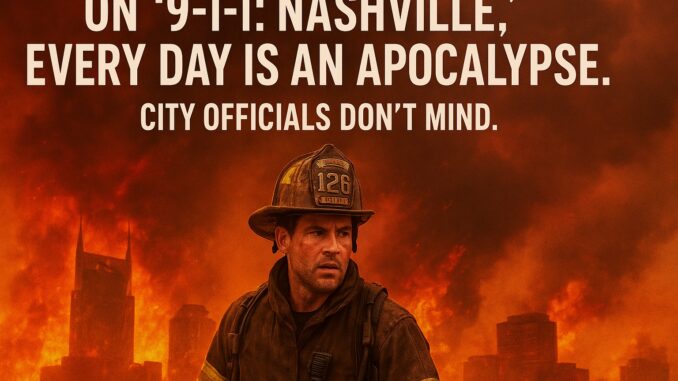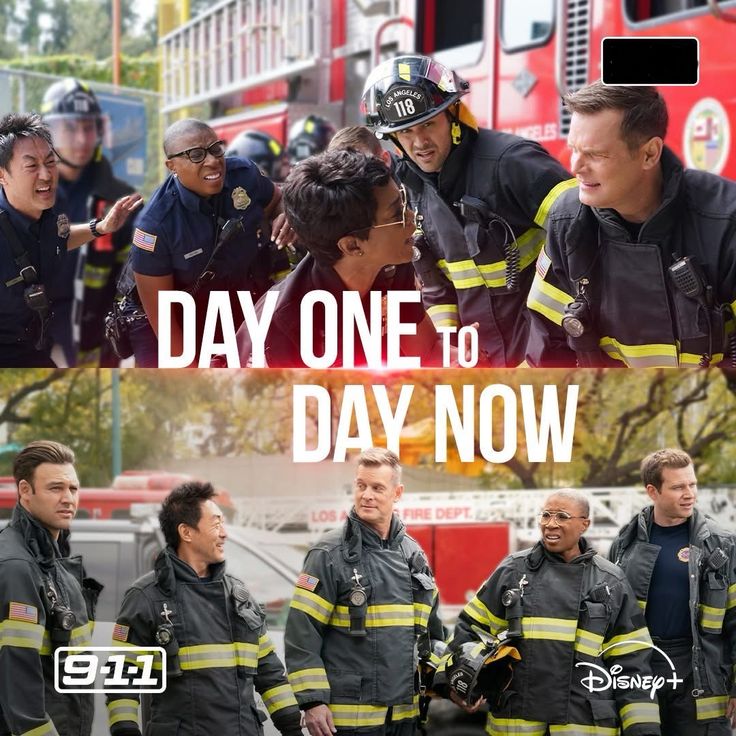
Why ‘9-1-1: Nashville’ Lives on Chaos—and Why Viewers Love It
If there’s one thing the 9-1-1 franchise has mastered, it’s turning the ordinary into the extraordinary. But ‘9-1-1: Nashville’ takes that formula, cranks it up to eleven, and sets it on fire—sometimes literally. In this spin-off, every day feels like an apocalypse, and somehow, the city’s officials are totally fine with that. Let’s dive deep into why the show thrives on catastrophe, how Nashville became the perfect playground for high-stakes storytelling, and what makes this series impossible to turn off.
The Formula That Made the Franchise Famous
Turning Emergencies Into Edge-of-Your-Seat Drama
The 9-1-1 universe never shies away from heart-pounding emergencies. From skyscraper rescues to catastrophic pileups, fans expect the impossible. But Nashville takes that expectation and goes bigger.
The Human Story Behind the Sirens
Even though the disasters keep viewers glued, it’s the emotional depth and relatable characters that make the franchise resonate. Each emergency reveals another layer of humanity—fear, strength, love, loss.
Why Nashville Is the Perfect Setting for Controlled Chaos
A City Built on Spectacle
Nashville isn’t just a music city—it’s an emotion city. Big sounds. Big personalities. Big performances. So, naturally, the emergencies need to be just as big.
Blending Southern Charm With Catastrophic Energy
The contrast is irresistible:
One moment you’re listening to acoustic guitar on a quiet street. The next, a sinkhole swallows half the neighborhood.
Every Episode Feels Like the World Is Ending
Disaster Is the Show’s Love Language
Other series sprinkle in the occasional large-scale emergency.
Nashville says: “Why not do it every episode?”
The “Apocalypse Aesthetic”
Fans have started calling the show’s tone “apocalyptic realism.” It’s dramatic but grounded—wild yet believable.
Think earthquakes rattling the Cumberland River, chemical spills downtown, or a tornado ripping through an outdoor concert.
The Science of Nostalgic Fear
Disaster fiction works because it taps into something universal—we all fear losing control. The show turns that fear into a narrative engine, episode after episode.
City Officials Don’t Just Tolerate the Chaos—They Encourage It
Boosting Tourism Through Cinematic Catastrophe
Surprisingly, Nashville officials have embraced the series. Why?
Because exposure is exposure, even if the city is drowning, burning, and breaking on national TV.
Showcasing Local Landmarks—even When They’re Falling Apart
From the Ryman Auditorium to famous Broadway bars, the series transforms iconic locations into disaster zones.
It’s destructive, yes—but it puts Nashville in the spotlight.
A PR Strategy Wrapped in Rubble
It’s almost genius:
The more chaos viewers see, the more intrigued they become about the real city.
The Characters Who Keep the World From Actually Ending
First Responders as the Heartbeat of the Show
The first responders in 9-1-1: Nashville are more than uniformed heroes—they’re the emotional anchor of the franchise.
Complex Lives Behind the Badge
Each character brings something different:
-
A firefighter battling survivor’s guilt
-
A dispatcher juggling motherhood
-
A rookie paramedic facing his first on-scene trauma
Their personal storms often rival the on-screen disasters.
Relatable Struggles in Unreal Situations
We may never outrun an explosion or rescue someone from a collapsed bridge, but we do understand fear, doubt, and courage.
That connection is the secret sauce.
The Realism Behind the Ridiculousness
Writers Consult Real First Responders
Despite the show’s big explosions and unbelievable events, the emotional beats are authentic. The writers work with firefighters, EMTs, and police officers to ensure realism.
Real Disasters as Inspiration
While the show exaggerates, many emergencies are inspired by true events—just dialed up for TV.
How the Show Keeps Audiences Hooked Season After Season
Escalation as a Storytelling Tool
Each season increases the stakes. If the pilot featured a massive downtown blackout, season two might roll in with a multi-building collapse.
Cliffhangers That Make Fans Scream
The show knows how to end an episode—with just enough tension to make you queue up the next one instantly.
Why We’re Addicted to Watching Things Fall Apart
A Safe Space for Chaos
Watching disasters on TV gives audiences the thrill of danger without actual risk.
It’s like riding a roller coaster—your heart races, but you’re strapped in.
Disaster as Emotional Catharsis
We release stress when we watch fictional chaos. It’s strangely therapeutic.
The Psychology of “It Could Be Worse”
Seeing fictional catastrophe makes real-life problems feel smaller.
It’s darkly comforting.

Nashville’s Culture Plays a Bigger Role Than You Think
Music as a Narrative Thread
The soundtrack of the city adds emotional resonance—even when the world is falling apart.
Community Spirit in Crisis
Nashville is a city known for resilience; that identity shines through every rescue, every storyline, every comeback.
The Future of ‘9-1-1: Nashville’
Bigger Emergencies, Bigger Emotions
Expect more ground-shaking disasters, deeper relationships, and new characters who push the story forward.
A Franchise That Shows No Signs of Slowing Down
As long as viewers crave intensity, Nashville will keep delivering.
Conclusion
At its core, ‘9-1-1: Nashville’ isn’t just a disaster show—it’s a human story wrapped in chaos. Every day might look like an apocalypse, but the characters remind us that courage, compassion, and connection survive even the worst days. And strangely enough, the city itself seems to love this wild, exaggerated version of reality.
Maybe because, beneath the destruction, the show celebrates what makes Nashville special: heart, resilience, and the ability to rise again—no matter how many times the world seems to end.